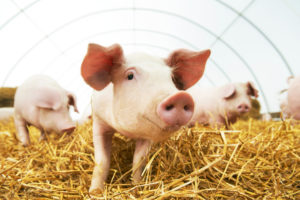After rebranding, feed manufacturer Crespeo and co-product valorisation partner, Looop, are intensifiying their focus on high-quality, cost-effective and ecologically viable feed solutions
Ibbenbüren (Germany) / Venlo (The Netherlands), July 2021: Supporting farmers with sustainable feed solutions is the common goal of German feed manufacturer Crespeo and its Dutch distribution partner Looop. After launching their new brand names, both companies are focusing on circularity and sustainability. The independent hub Looop distributes a wide variety of organic co-products from the food and fermentation industry, with Crespeo contributing wheat production suitable for pig feeding. This intensive cooperation contributes to the circular economy and ensures less wastage of raw materials.
 Crespel & Deiters Group’s feed brand is now called Crespeo, with Looop also undergoing a recent company rebrand. Both focus on the needs and welfare of the animal, the farmer and the joint mission to combat waste of raw materials. Looking at the bigger picture, Heike Sander, Head of Marketing & Communications at Crespeo, comments: “The task of dealing more sustainably with the environment is one of the most urgent challenges of our time: we need all the players — politicians, agriculture, industry and consumers — to pull together.” As a distributor and logistics partner, Looop is a link in this process and closes the circle by making valuable co-products usable, e.g. from starch production. In doing so, Looop relies on partnerships with like-minded companies such as the Crespel & Deiters Group, Crespeo’s parent company, who share its vision of zero waste.
Crespel & Deiters Group’s feed brand is now called Crespeo, with Looop also undergoing a recent company rebrand. Both focus on the needs and welfare of the animal, the farmer and the joint mission to combat waste of raw materials. Looking at the bigger picture, Heike Sander, Head of Marketing & Communications at Crespeo, comments: “The task of dealing more sustainably with the environment is one of the most urgent challenges of our time: we need all the players — politicians, agriculture, industry and consumers — to pull together.” As a distributor and logistics partner, Looop is a link in this process and closes the circle by making valuable co-products usable, e.g. from starch production. In doing so, Looop relies on partnerships with like-minded companies such as the Crespel & Deiters Group, Crespeo’s parent company, who share its vision of zero waste.
All Crespeo products are free from synthetic preservatives, subject to the highest certification guidelines and developed according to food industry standards. In addition, the feedgrade GMP+, QS, FRA and Secure-Feed standards are complied with, and products are transported to the end user in special trucks certified for animal feed.
The Crespel & Deiters Group processes more than 300,000 tonnes of strictly controlled EU wheat every year, at least 75% of which is cultivated in Germany and so only covers short distances. The wheat grain is broken down into its components and processed for various sectors; food, pet food, non-food and animal feed industries. When wheat is processed into wheat starch, liquid wheat extract is created that, in addition to a high starch content, also contains high-quality proteins and amino acids. This extract is used by Crespeo as the basis for a nutrient-rich feed (Crespovit® Extract) and a highly digestible starch ingredient (Crespovit® Starch) for pig feed. Crespel & Deiters guarantees a sustainable valorisation of the valuable raw material by using and utilising 99% of the wheat grain.
Looop operates between the food industry (producers of co-products) and users of co-products such as livestock farming, and is committed to the sustainable use of raw materials. “Our driving force is a vision of a 100% circular world in which raw material and food waste no longer exists. We do this every day in our work by upcycling co-products as much as possible. But this is nothing new for us; we’ve been doing it for more than 30 years. With our own specialized transport company and by using data and business intelligence (BI), we’re optimizing our processes on a daily basis,” explains Bram Kuunders, Marketing & IT Manager, Looop. The use of co-products as ingredients for animal feed is just one of the sectors in which they are used. In addition, Looop trades co-products in markets such as pet food, insect food, bio-based materials and sustainable energy production. In addition to wheat, they are also active in co-products from potatoes, corn and other grains from the food and fermentation industry.
“In terms of sustainability, the origin and composition of the feed plays a fundamental role: the consumer demands more purity and transparency, while politicians also strive for transparency in the chain,” says Sander. “Our wheat-based feeds represent just one item in Looop’s catalogue of 100 circular products that master the balancing act between ecological responsibility and economic demands.”
July 2021